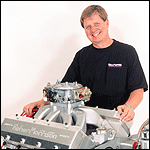 By David Reher, Reher-Morrison Racing Engines
By David Reher, Reher-Morrison Racing Engines
It’s often said that the only difference between men and boys is the price of their toys. Forty years ago, I earmarked the profits from my newspaper route to buy a new bicycle; today I can hardly wait to pick up my new 2001 Pro Stock Grand Am. I tell my accountant (and my wife) that a new race car is really an investment, a tool to promote our business and to keep Reher-Morrison Racing Engines on the leading edge of engine development. But just between you and me, I wouldn’t be gearing up for 24 weekends on the road next year if I didn’t enjoy racing.

